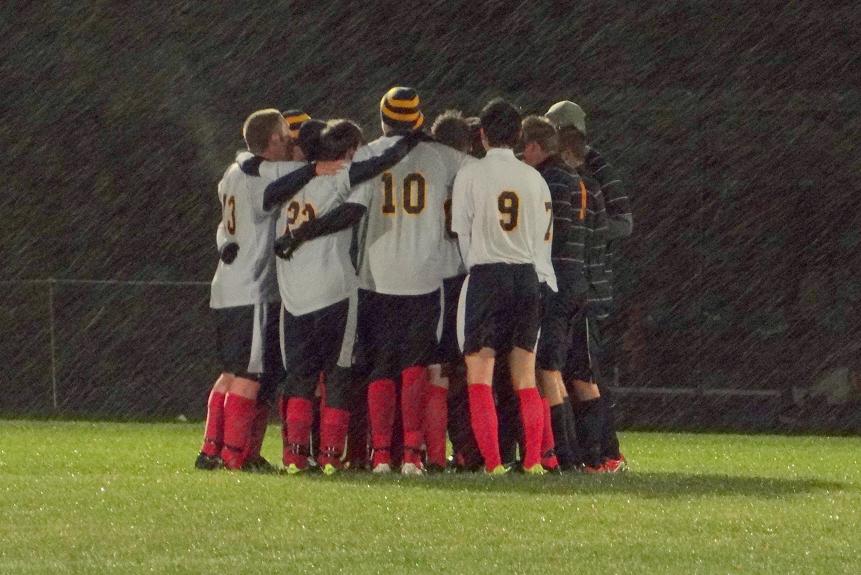
No Damper on this Rivalry
October 20, 2011
FREELAND – The Ovid-Elsie and Ithaca boys soccer teams play each other at least twice a season as members of the Tri-Valley Conference, and often again during the postseason. Usually those games are meaningful – both regularly are among the best in their league as well as district title contenders.
But a gesture brought on by Wednesday’s seemingly statewide downpour likely will become one of the most memorable moments of this rivalry.
Ovid-Elsie jumped to 6-0 lead by halftime of the team’s Division 3 district semifinal at Freeland. With winds blowing rain sideways and 30-40 mph, chances of an Ithaca comeback were slim.
The Yellowjackets had another bad turn when one of their defenders was injured running down an Ovid-Elsie breakaway early in the second half. Play stopped, and the Marauders’ defenders stood together to block each other from the rain and wind.
Soon, they were joined by two Ithaca forwards. Then midfielders from both sides joined. Eventually, all 21 players still on the field, aside from the one who was injured, formed a tight huddle near Ovid-Elsie’s net. The huddle was completed when Marauders goalkeeper Thomas Powers slid in among the mass of legs and emerged in the middle of the group.
“One of my players told me they were just playing rock, paper, scissors in there,” Ovid-Elsie coach Craig Thelen said.
“Both teams respect each other, play hard against each other. We split this season, and we split wins almost every season.”
Separated by 25 miles, the Ovid-Elsie and Ithaca players know each other only through soccer, Thelen said. But the rivalry, while physical, is friendly. That mutual respect likely grew Thursday.
As the person who submitted this photo wrote, “Like they say, ‘It's not whether you win or lose, it is how you play the game.’ This is how we should play a little more often.”
Ovid-Elsie eventually won 8-2, and faces Alma in the district final at 6 p.m. Saturday, also in Freeland.

Sportsmanship and Success in Soccer
August 16, 2012
Ralph Polson, president of the National Soccer Coaches Association of America (NSCAA), reports in the July/August 2012 Soccer Journal that there is a strong statistical link between sportsmanship and success in intercollegiate soccer. He cites the work of Tim Lenahan, head men’s coach at Northwestern University, who compiled total fouls, yellow cards and red cards for the 2011 season to create a “Fair Play Rating” (FPR).
Polson reports that 12 of the 20 teams with the top FPR made the NCAA tournament, while only one of the teams in the bottom 20 did. Of course, this is a statistical link, not necessarily cause and effect. But here’s how Mr. Polson concludes his column:
“How should we interpret this data? One direction is toward more disciplined teams. It seems to me the more a culture of sportsmanship and fair play is established, the more likely any team is to demonstrate the consistency needed for success. The data suggests those teams without entrenched standards, with respect to on-field behavior, should anticipate a higher likelihood of failure in today’s highly competitive environment.
“Play within the spirit of the game and more than just a win may be gained; play against the spirit of the game and much more than just a game may be lost.”
Dr. Brian Crossman, chair of the NSCAA Ethics Committee, contributes this to the discussion in the same issue of Soccer Journal:
“A five year study from 2007 to 2011 of almost 4,700 intercollegiate soccer matches in which only one player was red-carded during the match showed a strong likelihood that the player’s team would lose. Teams that had one player red-carded lost 67 percent of the matches, tied 10 percent of the matches and won 23 percent of the matches. In other words, a team that had a player red-carded at any time during the match was three times more likely to lose the match than win it. Taking steps to encourage clean and fair play, and thus to reduce the likelihood of having players ejected, will pay dividends in sportsmanship and should improve your team’s won-loss record.”
For more, go to www.nscaa.com.

